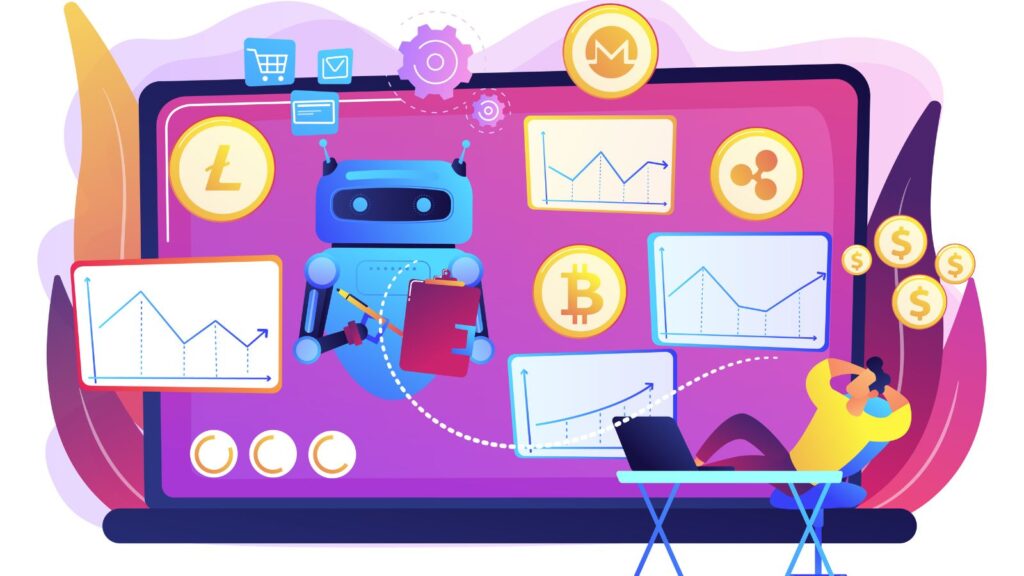Cryptocurrency has the potential to improve the future of the financial system by employing fast, safe, and affordable transactions on a global scale. As blockchain supports the movement of digital assets and can connect users with different applications, such as decentralized markets, exchanges, and organizations, emerging cryptocurrencies are gaining the trust of prominent institutions.
Bitcoin, for example, is the first and most popular digital asset whose benefits make it eligible for worldwide adoption. That’s why using BTC/USDT as a pair allows individuals to profit from rising and falling markets as they trade crypto against currencies.
However, trading is becoming more complex due to evolving technologies and the growing demand for high productivity. Therefore, users and organizations can approach the promising abilities of artificial intelligence. Training algorithms can support better trading outcomes by minimizing human errors and finding more opportunities on the market, so let’s see how that could work.
Use cases of AI in trading
Trading cryptocurrencies involves extensive research on the market and its assets. It includes an analysis of fundamental, technical, and sentimental patterns of assets and their performance. In addition to the required analysis of historical data, traders must also be wary of changes happening in the present and try to forecast trends as accurately as possible.
So, being a successful trader takes a lot of time and effort, but with AI, users can prioritize their goals better, as some of its use cases include the following:
- Processing huge amounts of data fast with machine learning algorithms;
- Gauging market sentiment with NLP (natural language processing) that analyzes news articles and social media;
- Executing trades based on predefined strategies automatically when the market conditions allow it;
- Identifying trading patterns and anomalies based on data analytics;
Main benefits of AI in trading crypto
Cryptocurrencies are volatile assets, meaning predicting prices and trends can be more difficult than with stocks and bonds. Luckily, AI-based strategies can make this task simpler by:
- Using predictive analysis to improve risk management;
- Leveraging trading strategies without emotional bias;
- Utilizing data-driven insights for better decision-making;
- Boosting efficiency through data processing;
In other words, AI can automate all tasks that users had to do manually before, sparing them time and resource requirements. So, they can focus on improving their strategies and expanding by diversifying portfolios and focusing on risk management.

Possible challenges of AI in trading
Although AI has the potential to improve crypto trading, it could also subject users to possible errors and mistakes. That’s because algorithms are not developed enough to not produce false signals of market changes, which can confuse the user. Such a coding error can lead to unexpected losses, but there’s also the other side of the story.
Machine algorithms are prone to overfitting, which means they memorize the training set so much they fail to make predictions on new data. In the long run, this makes the AI system unusable as it can’t adapt to the unexpected volatility of the crypto ecosystem.
Finally, the current regulatory issues make it difficult for AI startups to provide real support to crypto traders, as the limits of jurisdictions hinder compliance. Therefore, even if some users could access AI-based trading tools, their effectiveness would be limited.
The potential of AI in creating crypto coins
Besides helping traders make better decisions and seize opportunities, AI can also improve how cryptocurrencies develop. Several projects currently use advanced algorithms based on AI to test the monetary value in real time of such technological designs.
AI coins have an enhanced market appeal at the moment, which is why these assets are trending:
- Fetch.ai allows users to create agents and act on their behalf for making transactions and communicating;
- SingularityNET lets users monetize their AI services within a decentralized network;
- Numer.ai leverages high-quality data to predict market trends;
- Render makes use of unused GPU and offers it to users on the rendering platform;
How can AI improve the crypto market in the future?
AI can improve trading and support unique cryptocurrencies and projects, but there’s more to its future capabilities. For example, predictive accuracy will improve soon as machine learning technologies will receive better code design. This could minimize the risks of trading, as algorithms will be increasingly precise about crypto prices.
Moreover, as AI technologies and tools become more available and trustable, the ecosystem will reach a competitive level, which will benefit traders with lower prices and risk-free strategy testing. Building confidence in crypto trading capabilities will also support the market’s development.
Eventually, AI developers can collaborate with financial institutions more to find common ground on customer protection, anti-money laundering (AML), and counter-terrorism financing (CTF). As technologies evolve, they must strengthen their connection to ensure users are not exposed to significant risks.
Will AI take us closer to the Web3 future?
Web3 is the next stage of the Internet, where decentralization is the keyword. The online environment we know today will be significantly different in a few decades, when blockchain, crypto economics, and user ownership will become the norm.
Parts of Web3 are already being developed, and it’s difficult to say when it will happen, but the emergence of AI considerably contributes to its establishment. As traditional industries shift to AI and similar technologies, we’ll witness a transformation in how transactions are done and how investments evolve.
AI will handle tedious and repetitive tasks so humans can focus on creative ways to improve the financial system. Therefore, a hybrid approach between artificial intelligence and human intelligence should be the common ground needed for the world to slowly shift toward a decentralized future.
What do you think about AI in cryptocurrency trading?
Cryptocurrency trading can be challenging due to volatility, but AI can help improve it through automation and predictive analysis. Machine learning algorithms can process huge amounts of data and use it to foresee the future of digital assets, while natural language processing can help users understand how emotions affect the market. Considering that many coins already use AI, we expect this emergence to support the incoming Web3 world, where decentralization and immutability rule.




